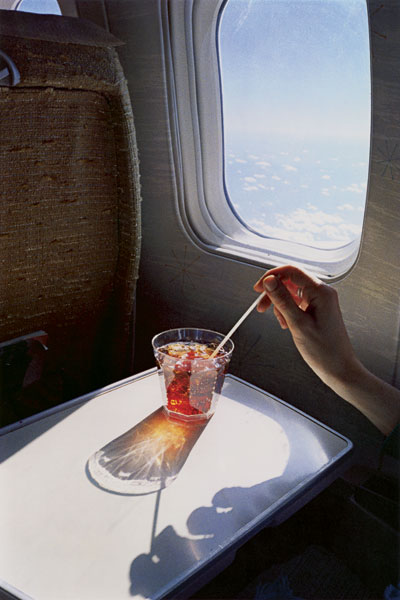Tuesday, March 13, 2012
Tuesday Travel Tips: Avoiding Jet Lag
 |
| photo by William Eggleston |
Jet lag might seem like a small price to pay for the adventure of international travel, but it can still be a huge inconvenience, especially if your travel time is limited. There is nothing more annoying than wanting to discover the sights and sounds of a new place, only to be struck by jet lag’s paralyzing, mid-afternoon exhaustion. Not to mention the horror of being wide-awake at 3am with nothing to do but watch MTV Asia. But how do you stop jet lag from plaguing your trip? Every savvy traveler has their own solution, ranging from homeopathic remedies to superstitious rituals, but the key is always the same: stop this cycle before it begins.
One way to successfully combat jet lag is through homeopathic remedies. No-Jet-Lag is one of the most common brands and is available at almost any travel store for about $15. While many travelers swear by its efficacy, this miracle cure has its drawbacks. In order for No-Jet-Lag to work, you need to take one pill every two hours throughout the international flight. For those who don’t sleep on airplanes, this is a great solution, but if you are anything like me, and try to sleep away the discomforts of economy air-travel, the benefits of No-Jet-Lag are voided.
Jet leg isn’t just about changing time zones; it’s also a bodily reaction to being inanimate for 12 hours in a pressurized cabin. So it’s important to start battling jet lag even before you step on the plane. One thing to remember is that pressurized cabins and recycled air suck all of the moisture out of everything, including your body. There’s a reason airplane food looks freeze-dried and is smothered in unidentifiable sauce. So if you decide not to go the No-Jet-Lag route, or even if you do, here are a few tips to keeping your body healthy, happy and ready to acclimate to the new time zone:
· Hydration is key! Drink lots of water while you are on the plane. Most airlines skimp on providing you with bottled water, so bring your own. Since security won’t allow you to carry water into the airport, you will have to buy it at your gate. I know it’s expensive, but it is worth it to have at least one large bottle of water for your flight. Remember, many of you will be in the air for at least 12 hours, so keep drinking.
· Avoid airplane food! This might sound like a no-brainer to most of you, but it is still worth reiteration. Not only do we have no idea where that food came from, it is also jam-packed full of sodium, which will only dehydrate you more. Some people prefer to not eat at all on the airplane, but I like to bring at least a snack to munch on. Dried fruit is a good option or even trial mix; something small that will help tide you over until you can get a real meal that wasn’t microwaved twice in the air.
· Move Around. Being cramped in one position for hour-upon-hour is no friend to your body. And no one outside the airline industry has ever tried to claim economy seats are comfortable. Make an effort to get up and walk around the cabin at least once during the flight. This will help keep your blood circulating and ward off swollen feet.
· STAY AWAKE! Traveling for hours is exhausting. When you land, it’s tempting to go straight to your hotel and sleep. DO NOT DO THIS. It’s important to acclimate to the new time zone on day one. So stay up, go sight seeing, get some food and don’t go to sleep until at least 10pm local time. You shouldn’t have trouble falling asleep on this first night, but if you do, try taking natural sleep aids, like Melatonin, to help regularize your sleeping pattern. By aligning your sleep schedule with your new time zone on day one, you can avoid the aggravating cycle of jet lag before it begins.
Live Learn Travel,Student Travel Tips,Teacher Travel Tips
